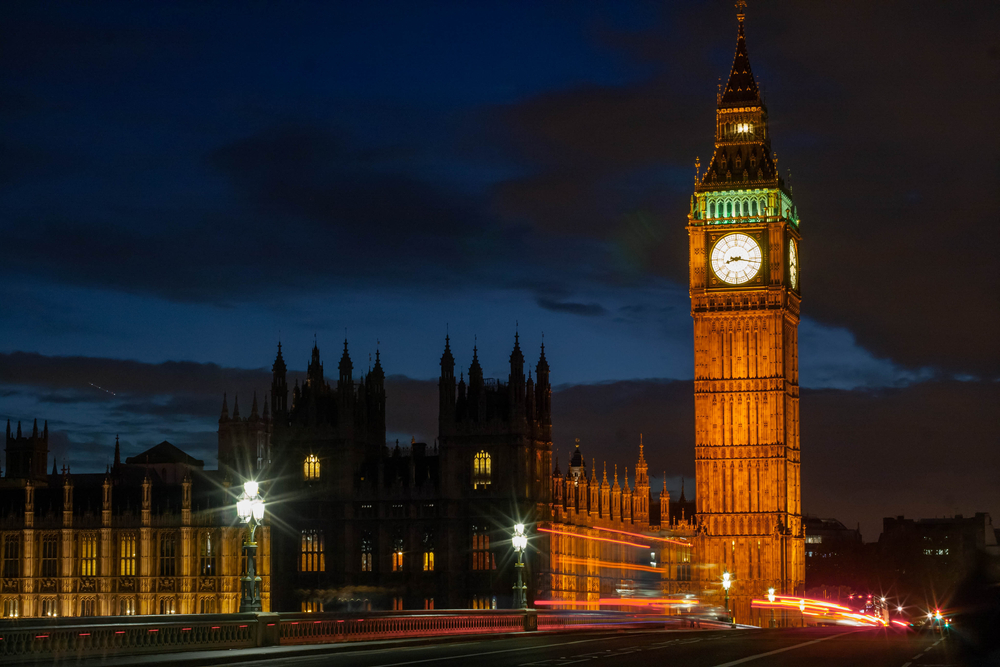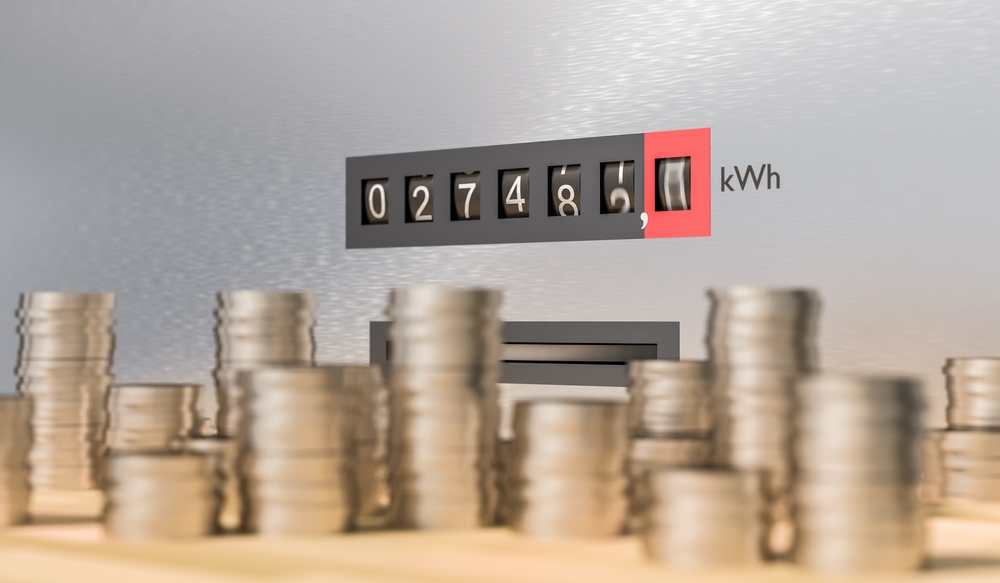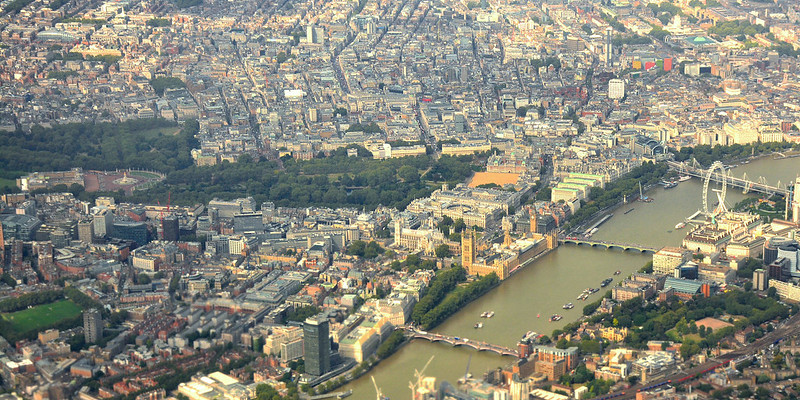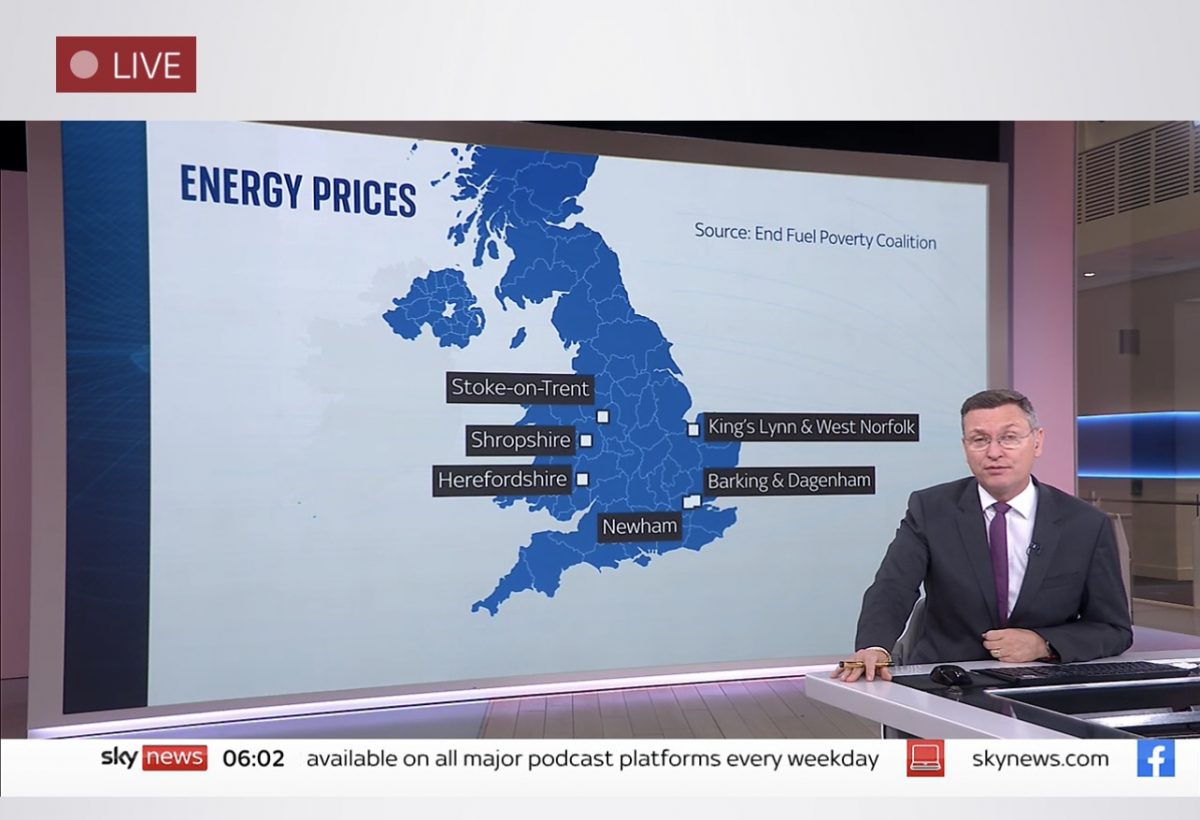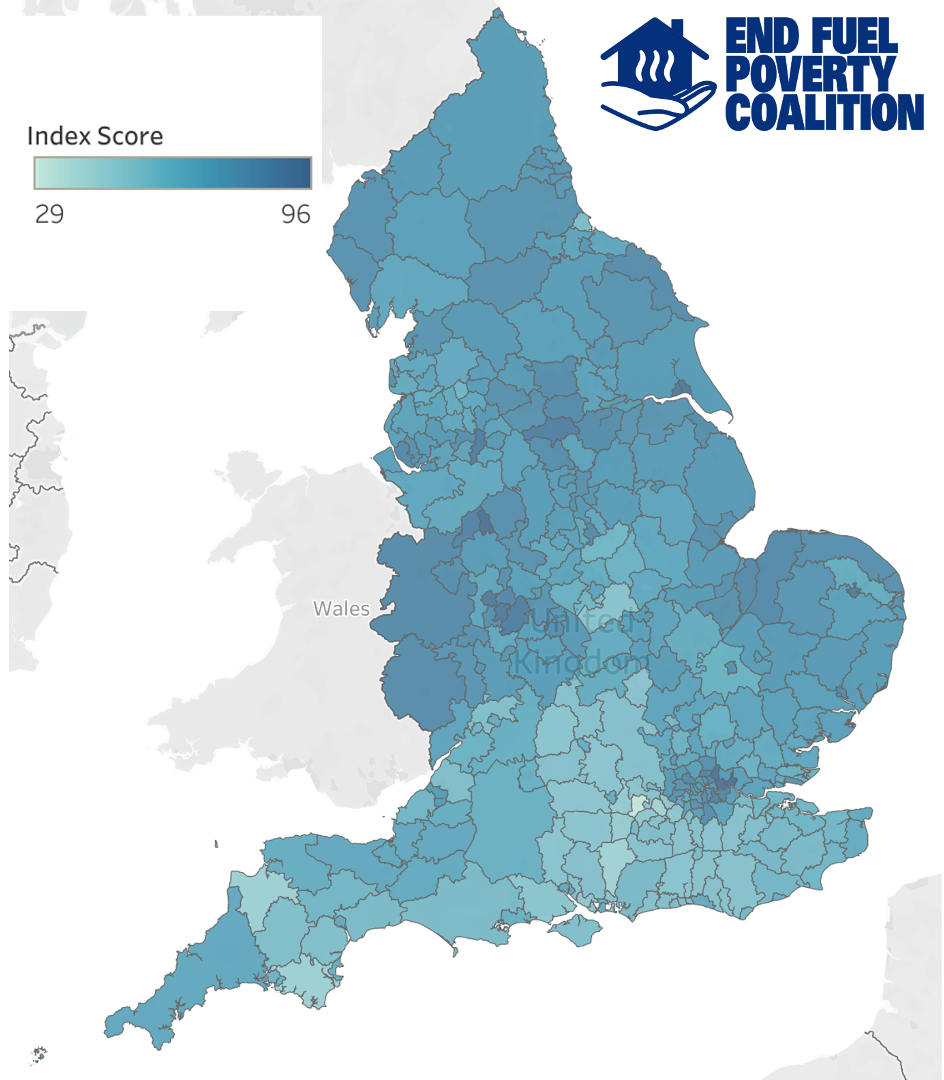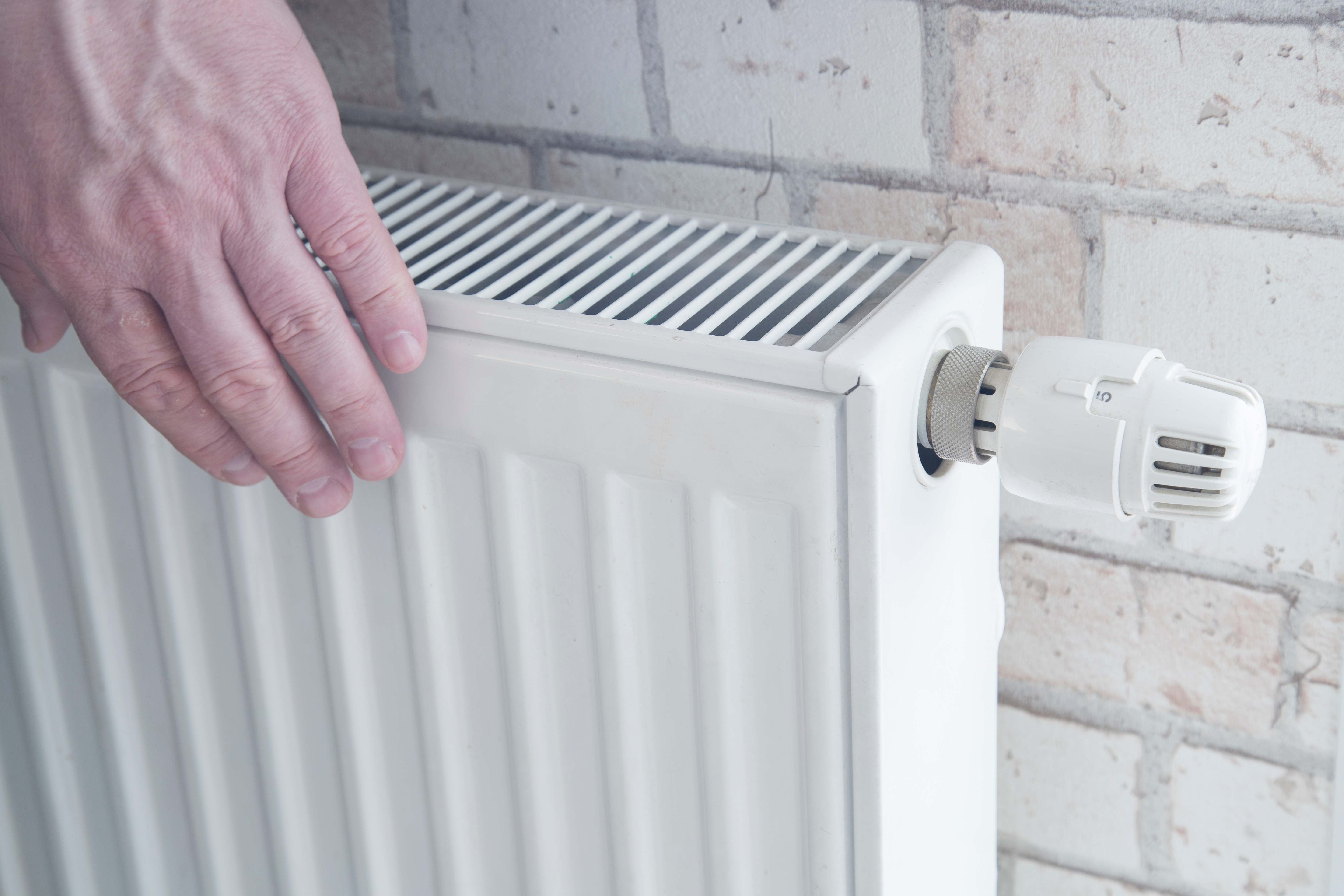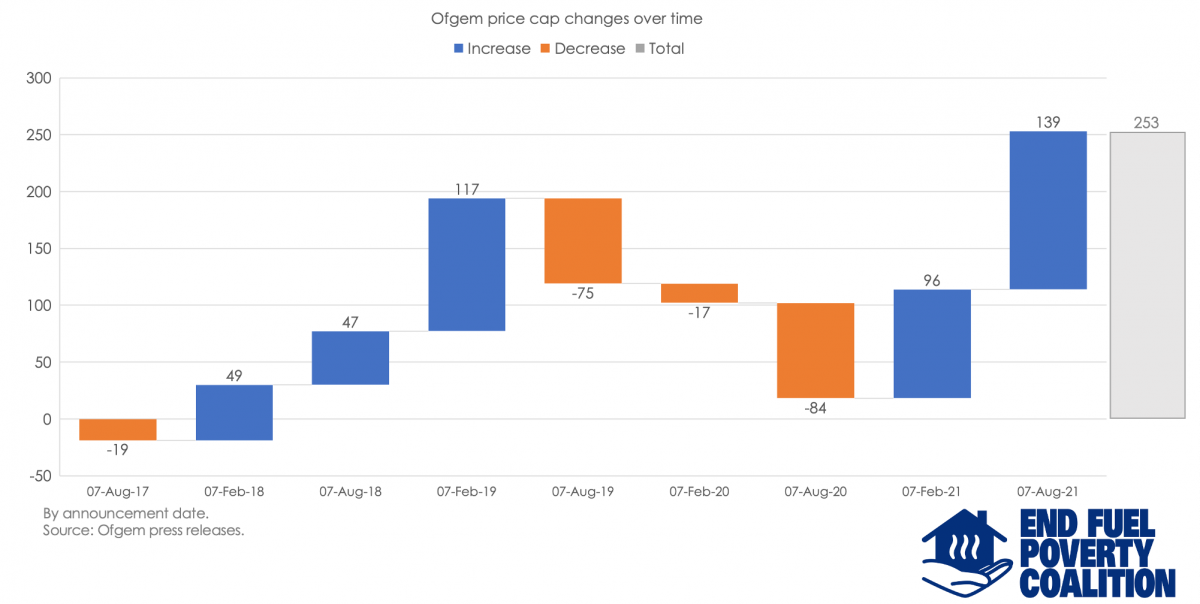A new map of England has laid bare the stark reality of the high number of people living in fuel poverty, with millions of households affected. [1]
The Fuel Poverty Index has created a league table of local authority areas by combining fuel poverty figures with data on measures improving energy efficiency and therefore reducing fuel poverty.
The worst place in England for fuel poverty is Barking & Dagenham, followed by Stoke-on-Trent and Newham. [2]
But it’s not just inner city areas which are badly ranked in the map with Shropshire, Herefordshire and King’s Lynn and West Norfolk all struggling with fuel poverty.
Meanwhile Bracknell Forest, Runnymede and East Hampshire are among the areas least affected by fuel poverty.
The map has been released as the ongoing energy crisis could see fuel poverty becoming endemic in society, according to campaigners.
The latest calculations [3] have revealed that rising wholesale energy prices could see the number of households in the country rise from the current estimate of 4.1m to 5.3m. This would equate to 22% of all households in England classified as being in fuel poverty.
The End Fuel Poverty Coalition recently launched a petition with campaign website Action Storm to call on the government to take immediate action to avert the fuel poverty crisis this winter. [4]
Simon Francis, co-ordinator of the End Fuel Poverty Coalition, said:
The latest rises in wholesale prices means that we face the possibility of more households facing fuel poverty than ever before. And with fuel poverty comes increased risks of suffering the worst effects of respiratory illnesses, such as Covid-19.
Indeed, when combined with the increase in general prices caused by inflation and Brexit supply issues we face the real possibility of fuel poverty becoming endemic in our society.
Local authorities who want to understand more about what they can do have been encouraged to pass the Coalition’s fuel poverty motion [5]. William Baker from Solutions to Tackle Energy Poverty (STEP) said:
Local authorities are responsible for some of the most innovative and far-reaching initiatives to tackle fuel poverty.
However, the UK government must give all local authorities the powers and resources to make sure such initiatives are standard practice across the country.
Ruth London from Fuel Poverty Action, which is currently Crowdfunding to continue its grassroots campaign to tackle fuel poverty, said:
It cannot be those who have least already who end up paying the price for the UK’s dependence on gas. Total UK wealth increased by £900bn [6] over the pandemic yet people will die from cold this winter. We need a transformed pricing system and sustainable energy, housing and heating so all can keep warm and dry.
Caroline Abrahams, Charity Director at Age UK [7], said:
This map reveals stark inequalities in rates of fuel poverty across England. Many areas in the North are particularly affected, as well as Stoke-on-Trent, Birmingham, and London. The problem is that too many older people are living in energy inefficient cold homes, guaranteeing that they will be facing sky high bills.
Keeping warm through the winter is an annual challenge for older people on low fixed incomes. It’s vital that they keep the heating on as the cold can make many pre-existing health conditions worse. To avoid the knock-on impact on the NHS, older people who are worried about making ends meet must have the confidence to keep their heating turned up when the temperatures drop, so they can stay well.
The Government must provide support for households who are struggling the most. Longer term, we need to see greater investment in energy efficiency programmes, which will help lower bills, reduce anxiety for those in cold homes and protect people against any future surges in fuel costs.
Peter Smith, Director of Policy and Advocacy at National Energy Action, said:
This toxic cocktail of challenges will leave millions of households struggling to cope with less income and higher costs. For many it will be an impossible task.
We need immediate support for those on lowest incomes, we need to clear levels of household energy debt fast, we need to give more protection to the fuel poor from future price rises and we need to reduce people’s exposure to high prices by making homes more efficient.
The Centre for Sustainable Energy (CSE) has published energy saving advice and top tips for people worried their energy supplier is about to go bust or thinking of switching as prices soar. Ian Preston, Head of Household Energy at the CSE, said:
Keeping healthily warm is a basic human right and it’s wrong that so many people are struggling with cold homes when living in a developed country like the UK. Cold homes cause misery, ill-health and social exclusion.
Many government and industry support programmes, like furlough, are due to end soon and the energy advice sector will face a tsunami of demand from people needing support. We need urgent action from the government to maintain support for people in vulnerable circumstances.
Paul Dixon, from Action with Communities in Rural England (ACRE), commented:
The energy crisis will plunge many more rural households into fuel poverty this winter.
Rural homes are some of the most difficult to keep warm. Whilst immediate measures must be found to alleviate financial pressures facing the most vulnerable, there must be a longer-term commitment from government to insulating homes and supporting communities to generate their own local renewable energy solutions.
Christine Nicholls, Community Development Officer for Community Action Northumberland, added:
The timing of this increase will hit vulnerable families hard, families already struggling with the impact of the pandemic.
Guy Stenson, Director of Housing Operations – Customer Experience at Stonewater, said:
We recently appointed a fuel poverty specialist to provide advice and alleviate the pressures faced by our customers, tackling the energy crisis will require working with Government, partners and the wider sector to develop more rapid solutions.
To address the immediate challenge we are offering flexible rent payment arrangements and working closely with our voluntary sector partners and charity partner, Longleigh Foundation, to support those most in need.
ENDS
[1] For sources, calculations and methodology, please visit:
https://www.endfuelpoverty.org.uk/english-fuel-poverty-index-2021/.
[2] The ten local authorities worst affected by fuel poverty, according to the End Fuel Poverty Coalition Index:
– Barking and Dagenham
– Stoke-on-Trent
– Newham
– Waltham Forest
- Kingston upon Hull
– Sandwell
– Wolverhampton
– Birmingham
– Manchester
– Norwich
The ten local authorities least affected by fuel poverty, according to the End Fuel Poverty Coalition Index:
– Bracknell Forest
– Runnymede
– East Hampshire
– Torridge
– South Hams
– Hart
– Wokingham
– Fareham
– Surrey Heath
– Spelthorne
[3] For detailed calculations and methodology statement visit: https://www.endfuelpoverty.org.uk/price-cap-methodology/
[4] Petition: https://actionstorm.org/petitions/fuel-poverty-crisis
[5] Motion: https://www.endfuelpoverty.org.uk/end-fuel-poverty-councillor-pledge/end-fuel-poverty-council-motion/
[6] Report in: https://www.theguardian.com/business/2021/jul/12/uk-wealth-gap-widens-in-pandemic-as-richest-get-50000-windfall
[7] Age UK’s Advice Line is available 8am-7pm 365 days a year and can be reached on 0800 678 1602. Age UK provides information guides on staying warm this winter and reducing energy bills as well as a factsheet on the help available to consumers to meet their energy costs. The organisation also provides a free benefits calculator which helps older people to find out what benefits they could be owed.

